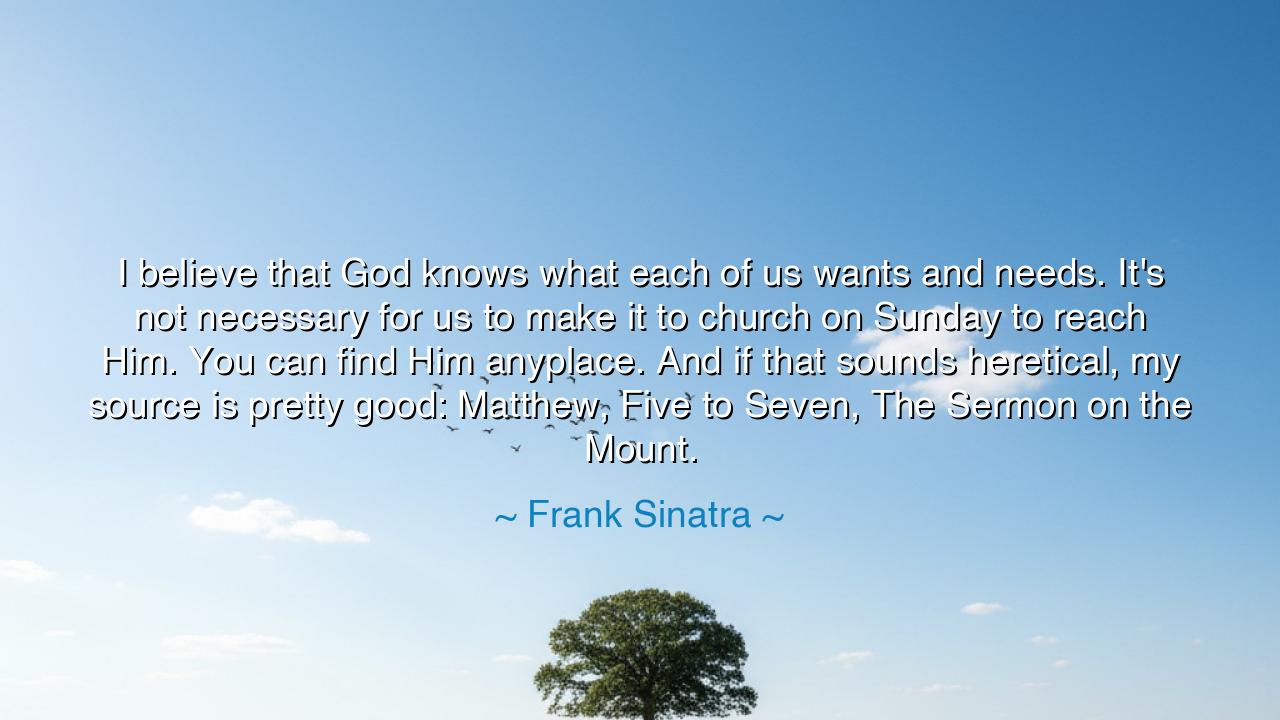
I believe that God knows what each of us wants and needs. It's
I believe that God knows what each of us wants and needs. It's not necessary for us to make it to church on Sunday to reach Him. You can find Him anyplace. And if that sounds heretical, my source is pretty good: Matthew, Five to Seven, The Sermon on the Mount.






The words of Frank Sinatra, the voice of a generation and a man whose artistry captured the human soul, resonate with timeless spiritual wisdom: “I believe that God knows what each of us wants and needs. It's not necessary for us to make it to church on Sunday to reach Him. You can find Him anyplace. And if that sounds heretical, my source is pretty good: Matthew, Five to Seven, The Sermon on the Mount.” In this statement lies a profound truth about the intimacy of the divine: God is not confined to walls of stone or ritual, but is accessible wherever the heart seeks Him. Sinatra, through his life of music, observation, and reflection, reminds us that the sacred permeates all existence and that connection to the divine transcends formal structures.
The origin of this quote is rooted in Sinatra’s lifelong engagement with both faith and the human experience. Growing up in Hoboken, New Jersey, amidst the struggles and joys of everyday life, Sinatra witnessed the longing for guidance, comfort, and understanding that pulses through human hearts. While he respected tradition, he recognized that the essence of God’s presence is personal, intimate, and immediate. By invoking the Sermon on the Mount, he links his insight to the teachings of Christ, emphasizing that divine truth has always transcended ritual, pointing instead to sincerity, compassion, and inner devotion.
At the heart of this teaching is the idea of omnipresent divine understanding. Sinatra suggests that God already knows our desires, needs, and struggles; our acts of worship or adherence to external form are not prerequisites for connection. This echoes the wisdom of the ancients, who taught that the divine is as close as one’s breath, as immediate as one’s awareness, and as universal as life itself. True communion with God arises from intention, sincerity, and reflection, not solely from prescribed practices or physical presence in holy spaces.
History offers examples of this principle in action. Consider Saint Francis of Assisi, who wandered amidst nature, ministering to the poor, and caring for animals, finding God not within temples alone but in the creation around him and the acts of compassion he performed. His life illustrates Sinatra’s insight: holiness and divine connection are not confined to formal observance but are revealed wherever love, humility, and service manifest. The sacred is not restricted to a building, a ritual, or a day of the week—it is woven into the fabric of everyday life.
Emotion courses through Sinatra’s words because they speak to the universality of human longing. Many seek God through external means, yet struggle to feel the divine in daily life. By emphasizing that God is accessible anywhere, Sinatra encourages the heart to seek connection in work, in music, in service, and in reflection. The divine is not distant or conditional; it is present in every moment, attentive to every human yearning, and responsive to the soul’s sincere reaching.
The lesson here is both liberating and empowering. One need not measure spirituality by attendance, ritual compliance, or outward appearances. Instead, the soul is called to seek God in intention, love, and compassion, cultivating awareness and reverence in all acts. Daily life becomes a sacred practice, where ordinary actions are transformed into communion with the divine. In this way, every moment carries the potential for grace, guidance, and spiritual growth.
Practically, this teaching invites mindfulness and authenticity. Engage in acts of kindness, speak with honesty, reflect with sincerity, and open your heart to the presence of the divine wherever you are. Music, nature, conversation, and contemplation become pathways to God. By trusting that God already knows your needs, you free yourself from anxiety over ritual, embracing instead a living, breathing relationship with the eternal.
Thus, the words of Frank Sinatra endure as both guidance and inspiration: “You can find Him anyplace.” Let them remind us that the divine is not confined, that connection transcends ritual, and that the human heart is the true temple. Seek God in all spaces, honor the sacred in all actions, and live with the awareness that every moment offers an opportunity to commune with the eternal. In this understanding, faith becomes both intimate and universal, grounding the soul in love, presence, and unshakable reverence.






AAdministratorAdministrator
Welcome, honored guests. Please leave a comment, we will respond soon